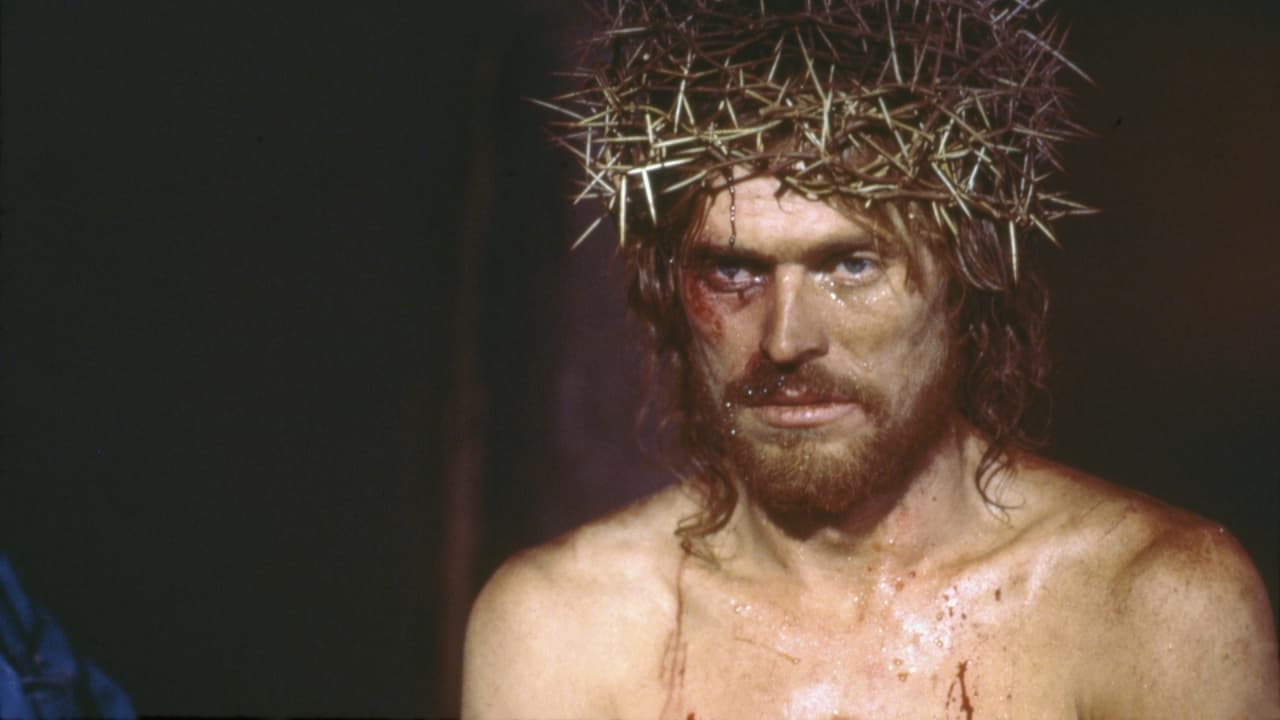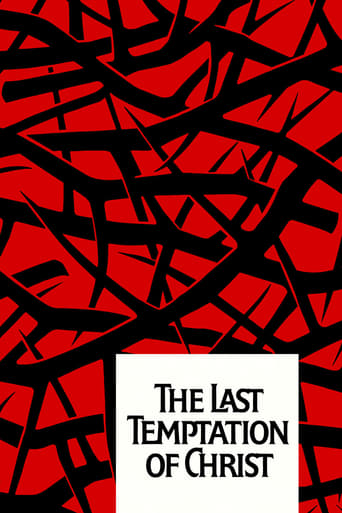

Good story, Not enough for a whole film
... View MoreDisturbing yet enthralling
... View MoreIt is not only a funny movie, but it allows a great amount of joy for anyone who watches it.
... View MoreA great movie, one of the best of this year. There was a bit of confusion at one point in the plot, but nothing serious.
... View MoreAnyone interested in religion and frightened off by all the negative hype in the 90's when this was released should see this film. The first time I watched it, out of curiousity, and although quite lengthy, (stick with it) the last hour will blow you away! With Keitel (Judas) and DeFoe, their combined presence is ample to engross the movie fan, add David Bowie's cameo and understated pilate and Peter Gabriel's score, Barbara Hershey, this is a film to be reckoned with and a profound experience...
... View MoreGoods: 1. Willem Dafoe as a cracked-out Jesus 2. Judas the Bro 3. Cool plot twist 4. Good first act or two, as well as the final act 5. Bangin' Peter Gabriel score 6. Rad imagery 7. Some parts still make no sense to me at all, but in a good way 8. Made me think a bunchNot So Goods: 1. Boring middle parts that lost my attention 2. "Biblical filler" can be tiresome if you're already well familiar, despite a few twists thrown around
... View MoreThe 1980s seemed to be a hit or miss period for legendary director Martin Scorsese. His biopic "Raging Bull" scored Oscar gold while quirky comedy "After Hours" received mixed reviews and under-performed at the box office (now it is a cult classic from the director's catalog). However the legendary director found himself in hot water when he decided to tackle the controversial religious novel "The Last Temptation of Christ" by Nikos Kazantzakis. Many considered the film to be blasphemous to Christian beliefs and was labeled offensive by various religious groups and some critics. Over the last 30 years, the scope of the movie has been reassessed and opinions have changed to see the film in a more creative light.The film follows the trials and tribulations of Jesus Christ as he is portrayed as more human than the divine figure most faiths are familiar with. Jesus is faced with human temptations like self-doubt and lust (which was what incited much of the film's controversy) in his path to eventually become the Messiah. The narrative does include Biblical elements from the New Testament once Christ begins to follow his divine destiny, but it is not a strictly Biblical tale; more of an interpretation based on some theological theories that Jesus was only human (the debate continues especially with works like Dan Brown's "The Da Vinci Code").Playing the important title role of Christ is the always reliable Willem Dafoe in what should have been an Oscar nominated performance. While the role was originally offered to Scorsese's go-to muse of the time, Robert De Niro, the filmmakers ultimately picked the most unlikely yet in the end, ideal, casting choice. Willem Dafoe himself has stated over the years he is still shocked he pulled off such a role in playing the Messiah, but if one watches the film it is an acting masterclass. Dafoe brings a convincing vulnerability to Jesus, making the character seem believably human even when he starts to become more sure of his path to being the prodigal Son of God. The quality only increases as Dafoe deftly handles the internal struggle to either simply be an average man or become the divine Messiah; the revealing moment is perfectly represented when Jesus faces his desert isolation and is confronted by his inner temptations. When Jesus finally accepts his status as the Son of God, Dafoe himself almost has a God-like divinity as he embraces his destiny but maintains his crisis of faith until the film's fiery climax where Christ must make the ultimate choice for the fate of the world: continue living an illusion or renounce his errors and accept the gruesome fate he is meant to endure.Providing an equally bravado performance is underrated actress Barbara Hershey as Mary Magdalene (mostly referred by her surname in the movie). Her characterization is based on the divisive theory that Mary was a prostitute as depicted in the film (which has since been dis-proved by respected historians); a flawed woman who wishes for Jesus to abandon his divine path and be with her. The actress owns her scenes as she spouts venom at co-star Willem Dafoe, unleashing all her anger while masking a hidden sadness. Hershey, like her co-star, should have received an Oscar nomination for the depth she brings to Magdalene. She never becomes a stereotype nor does she allow herself to fade in the background, but maintains a presence even when not physically on-screen (Mary is portrayed as a black snake in a visual metaphor when Jesus experiences his temptations during visions). A special mention should be made for the cameo appearance of the late David Bowie as Pontious Pilate. The British musician holds his own on-screen with Willem Dafoe's Jesus (who remains mostly silent during the scene). Bowie is calm and commanding as he delivers his dialogue with authority while remaining stoic in body language and in his vocal delivery. The part of Pilate was out of character for the quirky singer, but in true Bowie fashion the singer stands out even when delivering his lines to the film's star. Even Bowie's final parting words echo and resonate, leaving an indelible mark on the narrative.The movie's only black spot in acting is the Razzie nominated performance of frequent Scorsese collaborator, Harvey Kietel as Judas Iscariot. Normally Kietel brings his A-game to his roles and knocks the part out of the park, but taking the pivotal role of Jesus's treacherous disciple seemed to be a misstep in the actor's prestigious resume. While numerous other actors maintain their natural accents, Kietel's native New York accent becomes overtly distracting especially as the actor over-exaggerates his lines. Not the most awful performance of Kietel's career, his acting pales in comparison to the compelling and far superior performance of Willem Dafoe as both actors share numerous scenes together. If you choose to disagree with me about my opinion, go right ahead as this is only my opinion (though shared by critics of the time and some audiences).Under Scorsese's directorial eye, the narrative never ceases to provide insight into its subject though the pacing does slow at times. The cinematography is breathtaking (filmed on location throughout Jordan in the Middle East) with its vast landscapes and eye-catching visuals for its symbolism. The screenplay is taut as it is adapted by Scorsese's regular screenwriter (later turned director) Paul Schrader. Schrader keeps the source material intact even as he intertwines iconic Biblical moments including the wedding where Jesus turned water into wine, the cleansing of the temple after Palm Sunday to the ultimate crucifixion of Christ at the film's conclusion. Go into the film with an open mind which can help you appreciate the mastery behind the religious undertones.
... View MoreThe best part of the movie is reading the reviews of the religious people. Right, there is blasphemy in copious amounts, but it's not the kind you see in that famous church scene in the Exorcist. It comes from asking oneself the question: "how would a regular man pay the part of Jesus"? That's probably one of the most important parts of the movie.The scene with John the Baptist raises another question. "How would one know if a religious movement comes from God, or not." And, to me, at least the whole scene was quite disturbing, especially the crazed girl fans John had.Another point that is made in the movie is that Jesus doesn't need to be godly, or resurrect. His story, in the hands of the right sociopaths, will find its way. We are left wondering if it really matters if Jesus existed and died at the cross and if his life really had that kind of impact on world history, or is it just that we use him as an excuse for everything we do.My favorite part of the movie is the scene when Jesus enters Jerusalem. I think it's probably the music. All in all, I think is an OK movie, except for a few issues with pacing.
... View More